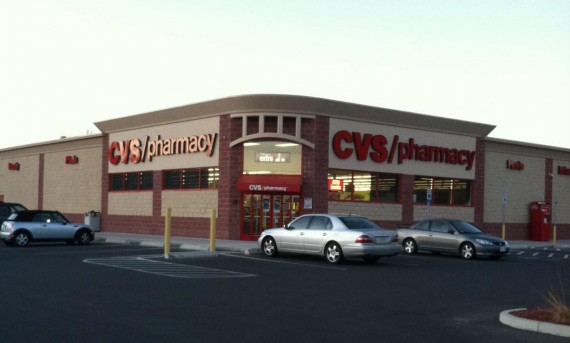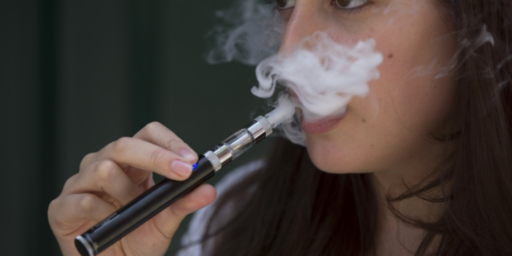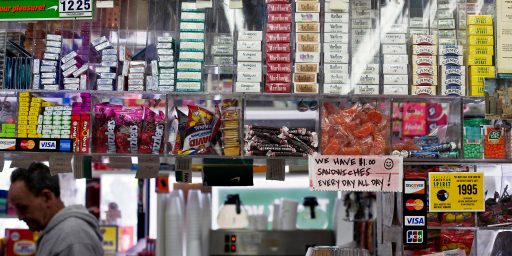CVS To Stop Selling Tobacco Products
CVS makes a business decision that is earning it kudos for the most part.
The big news of the morning is the announcement by CVS that it will stop selling all tobacco products in its stores this year, a decision that is being hailed by health groups:
CVS/Caremark, the country’s largest drugstore chain, announced on Wednesday that it planned to stop selling cigarettes and other tobacco products by October.
The company’s move was yet another sign of its metamorphosis into becoming more of a health care provider than a largely retail business, with its stores offering more miniclinics and health advice to aid customers visiting its pharmacies.
While the company’s decision will cost it an estimated $2 billion in sales from tobacco buyers, that is a mere dent in its overall sales of $123 billion in 2012.
“We have about 26,000 pharmacists and nurse practitioners helping patients manage chronic problems like high cholesterol, high blood pressure and heart disease, all of which are linked to smoking,” said Larry J. Merlo, chief executive of CVS. “We came to the decision that cigarettes and providing health care just don’t go together in the same setting.”
CVS does not sell electronic cigarettes, the highly popular but debated devices that deliver nicotine without tobacco and emit a rapidly vanishing vapor instead of smoke. It said it was waiting for guidance on the devices from the Food and Drug Administration, which has expressed interest in regulating e-cigarettes.
Some major retail stores like Walmart and convenience stores still sell cigarettes and other tobacco products, although antismoking groups and health care professionals will probably use CVS’s decision to try to pressure others to consider doing so. Municipalities have also begun enacting legislation governing where cigarettes can be sold.
Kathleen Sebelius, secretary of Health and Human Services, said in a statement that the CVS decision was “an unprecedented step in the retail industry” and predicted it would have “considerable impact.”
Ms. Sebelius said that each day, some 3,200 children under 18 will try a cigarette and 700 will go on to become daily smokers. That means, she said, that 5.6 million American children alive today will die premature due to diseases linked to smoking.
“Today’s CVS/Caremark announcement helps bring our country closer to achieving a tobacco-free generation,” she said. “I hope others will follow their lead in this important step to curtail tobacco use.”
And the company doesn’t seem all that concerned with the prospect that this is going to cost them business:
And as for driving away customers to competitors, Troyen A. Brennan, the executive vice president and chief medical officer for CVS, said: “It’s obvious that the average person will just find somewhere else to buy cigarettes. What we’re thinking about is if others want to emulate this business decision we’ve made, then over time that will make cigarettes less available — and scientific literature does suggest that a reduction in the availability of cigarettes reduces smoking.”
There are, of course, plenty of locations that have pharmacies and/or sell health-related products that also sell tobacco products. Other national pharmacy chains like Walgreen’s and Rite Aid come to mind, as do pretty much every grocery store chain, along with Wal-Mart. Although I shop there on a regular basis, I am unsure as to whether or not Target sells tobacco products, although I believe the answer is no. How many of these businesses are likely to follow CVS’s decision remains to be seen. No doubt, many of them will sit back to see whether the decision itself has any real impact on the company’s sales or store traffic. One estimate this morning stated that the decision is likely to cost CVS upwards of $2 billion per year, at least initially, however that number may end up being reduced if the company’s decision to re-brand itself as more of a health-conscious company (a decision that ending tobacco sales is part of apparently) brings more people into the company’s stores around the country. Walgreen’s has already released a statement this morning saying that it is still considering its own position on the issue of tobacco sales, but so far none of the other companies has had any comment on the issue.
Practically, of course, this is not likely to have much of an impact on a consumer’s ability to buy tobacco products. Just judging by my own immediate area, someone who has been in the habit of buying their cigarettes at the local CVS will easily be able to find what they want at by my count at least seven different locations within two miles of the CVS store ranging from grocery stores to gas stations to the local 7-11. The same, no doubt, is true of most of the areas where you’re likely to find a CVS store. Nonetheless, there’s a certain symbolism to the decision that no doubt played a role in the company’s decision here. As I noted above, CVS has slowly been trying to rebrand itself as a health-care retailer of sorts, ending the sale of a product like tobacco only seems like a logical extension of that marketing strategy.
My guess is that CVS will end up reaping more benefits than losses from this decision, especially in the long term, and that we’ll see other national companies make similar decisions, perhaps sooner than we might think. Whether we’ll see the same thing from other retailers, though, remains to be seen. Wal-Mart in particular likely makes a lot of money from its tobacco sales, so I’d say its unlikely that they’ll be taking the cigarettes out of there stores any time soon. The same goes for grocery stores. Eventually, though, it may well be the case that the only places where you’ll be able to buy tobacco products will be gas stations, 7-11s and similar convenience stores, and tobacco stores. To a large degree, though, this is a reflection of the fact that smoking has become far less socially acceptable than it used to be, and that is only likely to continue.






If they’d really done it for health reason they’d started with phasing out their liquor departments. But I guess there’s too much money in that.
That’s what this is, marketing. And to improve their image all they had to do was give up a product that was declining in sales anyway. Whatever “loss” they may suffer will grow smaller and smaller every year. Walgreen’s , which already does not sell liquor, will soon enough follow suit.
You forgot liquor stores Doug. I can’t imagine a liquor store that does not sell tobacco.
@Mu:
Actually alcohol…consumed in moderation, is good for you.
At least according to the numerous studies done on the topic.
Wake me up when they stop selling pork rinds, 128 oz bottles of corn syrup that say “Coke” on the side and Twinkees in 24 packs. When they do, maybe then I will believe they really are a “health provider” and not a retail business.
@edmondo: Good point, high fructose corn syrup kills more people than tobacco.
Tobacco products have some price sensitivity. CVS has been actually among the cheaper marketers. Though ‘discount tobacco’ outlets carry off-brands that have never been on CVS shelves, they seem to make their profit on name brands which they sell for up to $5/carton more than CVS. Convenience stores, too — as with everything else they carry — are more expensive than most other outlets.
Grocery stores, too, have a high mark-up. I think it likely that competing chains like Walgreens will pick up most of the slack, unless they, too, decide to go the route of dropping tobacco entirely.
The idea of selling something as patently unhealthy as tobacco in a store dedicated to provided health care solutions appeals to the Taoist in me…but neglecting that this obviously makes a good deal of sense. Also..CVS is still selling coke, and fried potato chips, and a bunch of other unhealthy stuff…so they ain’t saints. My inner Tao is still satisfied. Phew.
As you say…most CVS’s are in strip malls that also have other outlets for tobacco products so I don’t see people being overly inconvenienced by this.
The important thing to me is that it’s nice to see any participant in the free market doing the right thing…left to it’s own devices the market will invariably maximize capital. That means not taking a $2B loss on tobacco products…it also means fighting taxation, shipping jobs overseas, and paying workers minimal wages. America would be better off if every corporation spent more time worrying about what is good for the community and less about their bottom line. McDonalds, for instance, could stand to learn from CVS and begin to pay it’s workers a living wage. The Koch brothers could stand to learn from CVS and pollute our air and water a little less. Probably isn’t going to happen…but good on CVS for taking a step in the right direction.
@OzarkHillbilly:
You clearly don’t live in one of the dozen-plus states where liquor sales are a state monopoly, available only at a liquor-only state store. I can’t seem to avoid them, having lived in Pennsylvania, Maryland, and Virginia for large chunks of my life.
The other part of the decision is prospective: CVS does not intend to stock or sell reefer when it’s legalized.
Small clarification: I think this was $2 billion in revenue. I don’t know what profit margin there is on a pack of cigarettes, but I’m assuming its fairly low.
@Neil Hudelson:
Well, at least 50% of the cost of cigarettes is federal, state and local taxes. Then there are the actual costs of the product, so you profits are probably low at the point of sale.
Now, this is not a bad thing as long as the company is willing to take the hit on sales revenue.
But we should stand ready to repel the inevitable drive to raise taxes elsewhere to make up for the lost taxes from tobacco. The idiots allocated those taxes to schools and healthcare, even as they worked to reduce the sales. So now that people are stopping, those monies should come out of the hide of the taxing entity.
I could be wrong, but I think that’s where the vast majority of cigarette sales are made anyway. That’s where I bought them 99% of the time. The alternatives – except smoke shops, but why go to a smoke shop if convenience stores have them? – are simply less convenient than, ermm, convenience stores.
I’ve long believed that if you want to go after smoking, limit sales to smoke shops and only smoke shops* (okay, and liquor stores). I suspect that convenience stores, who make a lot of money off the availability of cigarettes**, would prevent such a law from passing.
* – We’d probably want to test this in some state before adopting it nationally, though. Reason being, it could backfire. If getting cigarettes is made to be too inconvenient, people may buy by the carton and end up smoking more.
** – Not just the sales of cigarettes. Too often, I’d go in for cigarettes and come out with a soft drink, a snack, and so on.
Brilliant idea. Now all the smokers can buy their cigarettes elsewhere.
And all the non-smokers will die of something else.
Profit margin on cigarettes is painfully low, I once managed a convience store in Pennsylvania, we made about two cents a pack. The only reason we carried them at all is that most people won’t make two stops in the morning for coffee and cigarettes.
CVS doesn’t stand to lose money directly from the cigarettes as much as loss of foot traffic.
I’ve seen more people buying cartons of cigarettes in gas station convenience stores than in Walgreen’s. Dunno whether that just says something about the local Walgreen’s, or what.
And how many people stop into CVS just for the cigarettes? Probably not many.
@JKB: Why? We need to fund our schools. If the money isn’t coming in from tobacco taxes, then it has to come from some other kind of tax.
Tangentially related – is everyone else seeing an e-cigarette boom? The storefronts are popping up in the OC like mushrooms.
@C. Clavin:
It might be correlation. The sort of person who can have just one glass of red wine with dinner probably is moderate in all things.
@john personna: I’m smoke-free since August thanks to e-cigarettes.
@trumwill:
That’s good, but I’ve also met a guy who could not get through a party without using his e-cig a few times and he never had been a smoker!
If those guys are rare I suppose it is all good …
@john personna: A couple of non-smokers have asked if they should give it a try. My advice is an adamant “no!”
From what I’ve read, about 10% of ecigarette smokers were not smokers prior to starting.
“The Center for Disease Control’s 2012 National Youth Tobacco Survey found that 10 percent of high school students have tried vaping at some point, 1.78 million people. This is double the previous year. One-third of these users are regular users. What alarms the CDC is that regular tobacco use nearly doubled during this time period as well. How much is attributable to the “starter” factor created by e-cigarettes is unclear.”
Worrying inroads with the youth, and especially at the start of a new “vaping” trend.
@john personna: I was moderate in all things *except* smoking. Nicotine was a totally different beast (for me) than anything else, before or since.
@john personna: Doubled from a rather small number. The same study that produced that result also said that 90% of the kids were already smoking and prior-month smoking went down by a larger increment than prior-month-vaping went up. In the spirit of alarm, they buried the good news.
It’s something to keep an eye on – and I would certainly support formally prohibiting youngsters from vaping, as well as extend the TV advertising ban – but there is really little reason to believe that vaping is actually serving as a gateway to smoking.
@edmondo: They always have some of my favorites at Halloween and Valentines Day: candy corn and those boxes of little hearts with messages written on them. Last week for the Super Bowl they had soft drinks at 1980 prices-2 liter for 59¢ !! We got a trunk load!
I am fine with their plan to end tobacco sales. Now if we could get convenience to follow that. I always wind up in line behind someone that wants a brand that the clerk takes forever to find.
@Trumwill:
I’m afraid I’d go all the way to regulating them as a medical device, if only in the over-the-counter degree.
Do you need flavors at all for quit-smoking?
CVS will face a dilemma when pot is legalized as it can be sold in many forms, not just smokes. It also has an acknowledged medical component, something not shared with booze, cigs and sugar. Maybe booze has some small benefits but it has to be closely monitored as death can result from OD. Cigs just flat out kill. Not so the mary-janelish.
@john personna: I’m not positive what “like a medical device” means. I’m guessing it means that I cannot get them at a convenience store. In which case, there’s a good chance I’d still be a smoker (as would other people I know). It would be the height of insanity to make these things harder to obtain than cigarettes.
As for flavors, yeah they’re helpful. One of the ways that I finally made the jump from dual-puffing (though 90% regular cigarettes) to exclusively vaping was when I embraced the things that made ecigs superior than regular cigarettes. That included the flavors. And I’m not as big a flavor guy as a lot of people are. Unlike blocking availability,this one may not have prevented me from making the jump altogether. But for some people it’s a huge selling point that regular cigarettes can’t really offer (even the old flavored cigarettes).
Which is one of the problems with the “ecigs are a gateway to regular cigarettes” notion. Once you’re vaping, the only real advantage cigarettes have over ecigs is… availability (and, in cold weather: heat). They’re less flexible, have an odor that makes people upset, require more personal maintenance, and require that you go out in inclement weather. They’re also far-and-away more deadly. (My wife is an MD with anti-smoking passion and is thrilled that I’ve made the switch, and recommends them to patience who have difficulty quitting.)
@Ron Beasley: I certainly am glad to see the removal of tobacco. But I do like to shop there for Halloween, Christmas, Easter, and especially Valentines candy. Also the neat little gadgets like the motion sensor stuffed animals that sing and Halloween monsters that make creepy sounds and light up. You can get stuff like that at CVS and no where else. And the days after these holidays you can really rack up on sales: 50% off and more. I still have a bunch of candy corn and candy bars from Halloween. And they ran soft drinks (name brand, not that watered down off brand junk) for 59¢ for 2 liters during the Super Bowl week!! Now I have a closet full!! CVS would be making a huge mistake by trying to become another sort of “health store”. We have GNC for that. That is where I go for aminos, creatine, protein, and other health supplements.